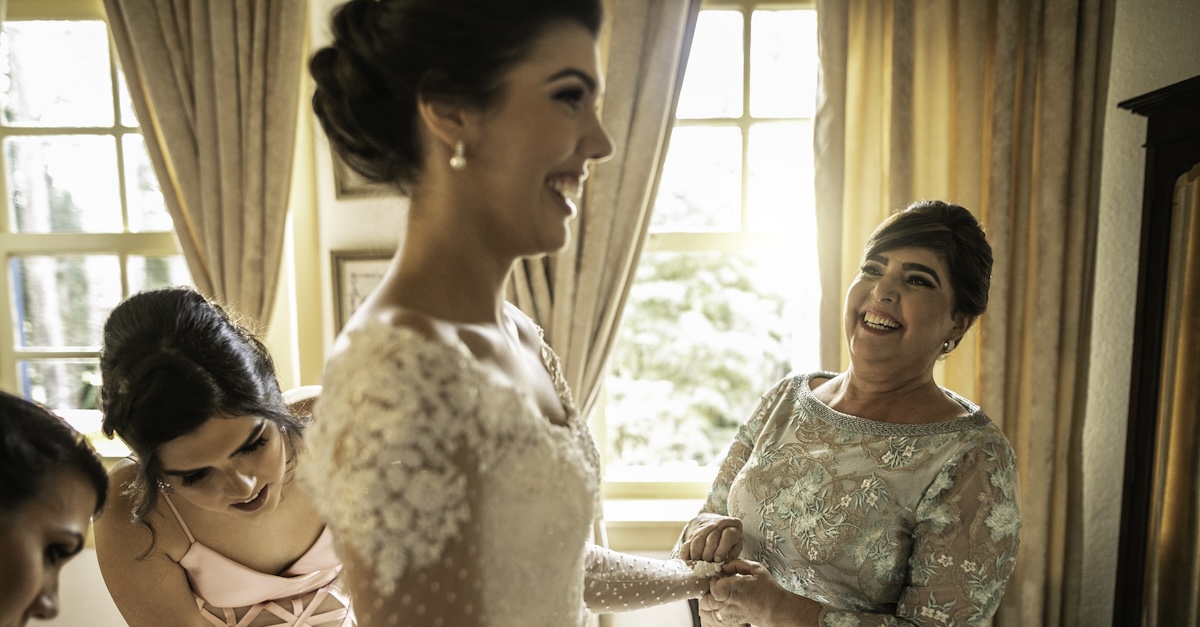How to Be Patient with Your Daughter When She Is Being a Bridezilla
Parenting


Audio By Carbonatix
By Carrie Lowrance, Crosswalk.com
Most girls dream about their wedding since they were children, and by the time they are adults, they have some ideas in mind about what they want their big day to look like. What we don't factor in as kids is all the things that go into planning a wedding, and this is when things get stressful. As a parent, it's exciting to help plan the wedding with your daughter, but it can be challenging if she becomes a bridezilla due to the numerous decisions and stress. Here are some ways to have patience and deal with your bridezilla.
Understanding the Stress of Wedding Planning
Planning a wedding isn't just about making decisions. Many things add to the stress of wedding planning. In our instant-gratification, perfection-based society, people expect weddings to go off without a hitch. Some brides have overbearing family members who also have certain expectations.
There is also the financial aspect of things. When the bride and groom pay for everything, it's stressful. When well-meaning family members offer to help pay and want things done their way, that adds to the stress, too. Fears of overspending or having a ton of debt left over also add to the mix.
Stress also contributes to mental and emotional health. Brides can become more anxious or depressed when planning a wedding. This can lead to insomnia, increased emotional outbursts, headaches, or digestive issues.
Relationship strain is also a facet of planning a wedding that can cause stress and cause strain between partners, family members, and friends. Collaborative planning can lead to disagreements or misunderstandings about different expectations. Tension often arises when choosing guest lists, selecting venues, and prioritizing budgeting. This all can lead to significant rifts among loved ones.
Identifying the Signs of 'Bridezilla' Behavior

When wedding stress increases, some women become 'bridezilla' and are difficult to handle. How do you decipher between normal stress and 'bridezilla' stress? Here are some signs to watch out for.
Excessive Control and Micromanagement: A prominent trait of bridezilla behavior is excessive control and micromanaging every aspect of the wedding. This might include overly detailed lists that account for every minute of the wedding, reluctance to delegate tasks to family and friends, and involvement in all communications with vendors, even though a trusted liaison has been set up to handle the communication.
Intolerance and Impatience: Intolerance and impatience arise when the bride completely loses her patience. She will make snap judgments or harsh critiques of others' contributions, and become irritable quickly when plans stray from the original vision, even in minor ways. And outrageous reactions to slight setbacks, such as a vendor being late.
Emotional Outbursts: Weddings cause a whirlwind of emotions, and they can often run high. Outbursts can include mood swings (from extreme excitement or extreme unhappiness), crying over minor issues, and emotions spilling out into public settings.
Obsession with Perfection: Brides seeking perfection will often end up in distress. Brides with these traits often change plans after making decisions and struggle to relax and enjoy the wedding planning process because they focus on perceived flaws. She will also dismiss fun and creativity.
Isolation and Withdrawal: Some brides will isolate themselves from everyone.
Disrespect Towards Others: They will disregard the feelings of family members and the bridal party, hurl overly critical comments at those who are trying to help, and have a sense of entitlement that overlooks the collaborative nature of wedding planning.
Financial Overreach: Brides will be frustrated and will direct that frustration at those who can't or cannot contribute financially.
The Importance of Empathy and Support
One of the most important aspects of dealing with a bridezilla is empathy and support. Being empathetic toward your daughter will make her feel heard and understood. This way, she is more likely to express her feelings without fear of judgment. Maintaining open dialogue will help prevent misunderstandings and resentment, which can escalate during the wedding planning process.
Being empathetic can also help reduce your daughter's stress by offering a sense of companionship and understanding, reminding your daughter she is not alone. Just knowing you care can reduce her burden, providing strength and comfort. It will also build trust with your daughter, showing her you value her feelings and the experiences she's gone through. Finally, empathy can foster a collaborative environment, which encourages brainstorming and problem-solving as a unit.
You can build a supportive environment for your daughter by:
-Listening actively
-Validation of feelings
-Offering solutions mindfully
-Expressing emotions openly
-Being patient
These things will be beneficial to both of you as you navigate this exciting and stressful time.
Setting Realistic Expectations for the Wedding Journey

Another way to have patience with your daughter is to sit down and talk about realistic expectations for her wedding. First, acknowledge her feelings of excitement, anxiety, stress, pressure, etc. This will make her feel validated and heard. From there, have an honest conversation about setting a realistic budget, the location and size of the venue, vendor contracts, managing time and responsibilities, and having a flexible mindset. She may feel like a bridezilla in the beginning because she feels out of control. Once you discuss and establish some guidelines, she may feel calmer and more in control.
Some things you will want to discuss include:
Budget: Discuss financial contributions, prioritize expenses, and research average costs of things.
Venue: Capacity and guest list, availability and time of year, and hidden costs.
Vendor contracts: Offer to do research together, schedule consultations, and just be wary of contracts.
Managing time and responsibilities: Start early, delegate tasks, and make time to enjoy the process.
Flexible mindset: Expect the unexpected, focus on the bigger picture, and celebrate small wins.
Effective Communication Strategies
Amid your daughter being a 'bridezilla,' it's hard to have patience while also communicating your ideas or concerns. This is where effective communication helps in a big way. Here are some ways to get your point across without losing your patience.
Understand your feelings: Take some time to reflect on what you are feeling and ask yourself questions like, 'What is specifically causing me to feel this way? Am I overreacting?'
Journaling: Writing down your thoughts and feelings can prepare you for having a conversation with your daughter.
Choose the right time and place: Preferably, select a private setting and ensure that everyone is in a good mental and emotional state before engaging.
Use 'I' statements: When expressing your feelings or concerns, use 'I' instead of 'you.' This will prevent your daughter from feeling attacked.
Be clear and specific: Use concrete examples to show your daughter how you feel. Like, "I feel like my opinions don't matter when I'm trying to help you with this wedding." Also, stay on topic.
Practice active listening: Show engagement by nodding and paraphrasing what your daughter said to make sure you understand correctly.
Stay calm and composed: Take deep breaths and avoid raising your voice.
Use non-verbal communication wisely: Maintain open body language and match your tone to your message.
Be open to feedback: Encourage dialogue and accept criticism gracefully.
Look for solutions: Brainstorm together to find solutions to issues that will give your daughter peace and set actionable steps to make things easier.
Follow up: Thank your daughter for listening to you and evaluate wedding planning progress going forward.
These communication skills will help you maintain your patience while discussing things with your daughter.
Knowing When to Step Back
Unfortunately, in some situations, nothing can appease a bridezilla. You may come to a point where your patience is exhausted and you have to step back. Offering help and giving space is a delicate balance. Here is how to know when to offer help and when to give your daughter space.
As a mom, it's normal for you to want to help, and here are the benefits of this.
Strengthened bonds: Offering help will make your daughter feel valued and cared for.
Emotional support: Providing support can ease stress and anxiety.
Building confidence: If your daughter thrives on external support, this will encourage her to face wedding planning challenges.
Reasons to Respect Your Daughter's Space
-Encouraging independence
-Avoiding dependency
-Personal reflection
Recognizing When to Step Back
Direct Signals: If your daughter states she needs to handle this on her own, let her.
Changes in Communication Style: If your daughter is silent or seems distant, this may be a sign that she needs space.
When expressing overwhelm: Saying things like "I just need time" is an indicator that she wants some time alone to make decisions.
Body language: If she is closed off or doesn't maintain eye contact, she may be uncomfortable or need personal space.
Physical withdrawal: Not spending time with friends and family also means she needs space.
Mood changes: If she seems irritable or distressed, intervention may not be welcome.
These are all signs that your daughter needs you to be patient with her and that she needs some space. The best thing to do is step aside and let her come to you when she's ready.
Planning a wedding is stressful for all parties involved, but if you take the steps to listen to your daughter, communicate effectively, and know when to step away, you both can get through this with your patience intact.
Photo credit: ©GettyImages/tonefotografia
 Carrie Lowrance is a freelance writer and author. She has had her work featured on Crosswalk, iBelieve, Huffington Post, and the Penny Hoarder. She is also the author of three children’s books, three clean romance books, one romance novella, three books of poetry, and one non-fiction book. When she’s not writing, she enjoys cooking and baking, reading, and hanging out with her husband, and sweet cat, Cupcake. You can find out more about Carrie and her writing at www.carrielowrance.com.
Carrie Lowrance is a freelance writer and author. She has had her work featured on Crosswalk, iBelieve, Huffington Post, and the Penny Hoarder. She is also the author of three children’s books, three clean romance books, one romance novella, three books of poetry, and one non-fiction book. When she’s not writing, she enjoys cooking and baking, reading, and hanging out with her husband, and sweet cat, Cupcake. You can find out more about Carrie and her writing at www.carrielowrance.com.


